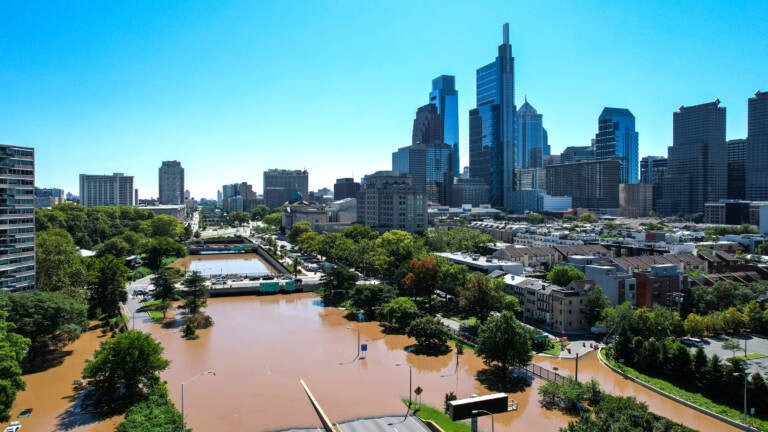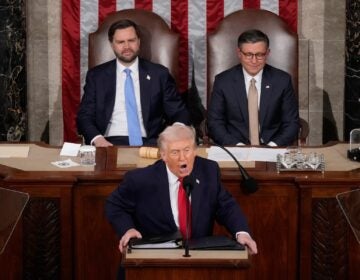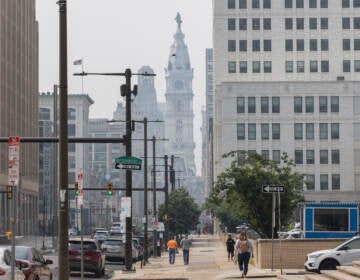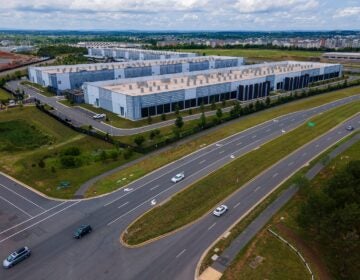PBS is coming to Philly to talk climate, community empowerment at Penn
The event is a two-part panel looking at “recasting the climate change narrative,” with a renewed focus on exploring solutions rather than emphasizing crises.

The Schuylkill River crested at more than 16 feet, and poured into I-676. (Mark Henninger/Imagic Digital)
On Sept. 12, PBS, WHYY, and the Penn Center for Science, Sustainability, and the Media will convene community leaders, science communicators, journalists, and leading scientists to discuss the value of storytelling to educate about climate change.
“Climate Solutions and the Role of Media” is a two-part panel to focus on “recasting the climate change narrative,” with a renewed focus on exploring solutions rather than emphasizing crises.
Panelist Michael Mann directs the Center for Science, Sustainability and the Media at the University of Pennsylvania. He said journalism should draw connections and illuminate climate change’s widespread impact — for instance, how wildfires in one part of the U.S. worsen air quality in another.
“The last few years as Gen Z has come into their own and started using the power of our voice [which] has allowed us to see this focus shift from alerting the community versus empowering the community,” said Mann in an email.
In a recent interview with PBS Newshour host Amna Nawaz, Mann explained the connection among recent fires, flooding, and severe storms across the U.S.
“Climate change is no longer some subtle, far-off, possible thing. It’s here and now,” Mann said. “It’s impacting us here and now.”
He said storytelling helps to translate the impact of climate change to daily life, so everyone can better understand.
“Explain without over-explaining — break down the lingo succinctly and accurately; and relate it to what is going on with the general public,” he added. “People will relate to issues better if they can see a way that it impacts them.”
Bill Gardner, vice president of programming at PBS, agreed.
“It’s about stories, and about community. It’s about people who are doing things and being active,” Gardner told WHYY News. “With a lot of scientific concepts, it can seem so abstract and so big.”
PBS focuses on stories that “give entry points for people who want to participate in the world,” and show how changes in the climate affect communities around them.
Gardner put it like this:
“You talk about the world that people inhabit, that they live in. And you put it in the context of understanding … the things that we’re experiencing.”
He hopes to equip people with tools to navigate the changing world.
Mann and Gardner agree that the evening will convey a clear message: The better audiences understand why climate change and the narratives surrounding science matter, the better equipped community members are to enact change — whether through lifestyle, education, or conversation.
Panelists will include:
- Reporter and editor, Susan Phillips of WHYY News Climate Desk
- Shane Campbell-Staton, Ph.D., professor, biologist, and host of PBS’s “Human Footprint” series
- Bill Gardner, vice president, multiplatform programming and head of development, PBS
- Maribel Lopez, Head of PBS Digital Studios
- Michael Mann, Ph.D., presidential distinguished professor and director of Penn Center for Science, Sustainability and the Media
- Bethany Wiggin, Ph.D., director of Penn Program in Environmental Humanities
- Fay Yu, Head of Current for Part2 Pictures
“Climate Solutions and the Role of Media” takes place Tuesday, Sept. 12 at 5 p.m. at the Harold Prince Theater on the University of Pennsylvania Campus. The event is free and offers open seating, however registration is required to attend. The talk will not be livestreamed, but a recording will be made available on YouTube shortly after.

Get daily updates from WHYY News!
WHYY is your source for fact-based, in-depth journalism and information. As a nonprofit organization, we rely on financial support from readers like you. Please give today.




